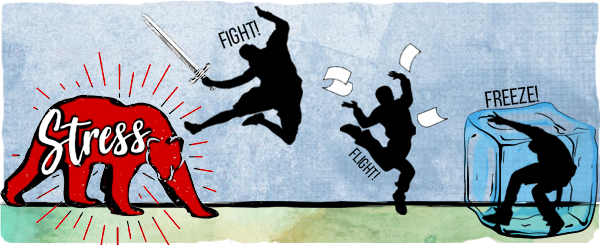Stress is a difficult emotion and we all have our ways to manage it. One of them is the Freeze response. This response has been observed by stress experts around the world, in addition to the most common ones: Fight and Flight. Indeed, sometimes we tend to freeze, instead of fighting or fleeing, in situations that we perceive as particularly dangerous. The fight or flight response is about hope: we activate it when we believe there’s a chance we can win over our attackers. The freeze response, however, gets activated when we feel overwhelmed by an aggressor and so we perceive that there is NO HOPE of beat the attacker. During the freeze response we endure the pain and manage to stay still, as we believe is only way we can survive the situation. In order to understand the fight or flight or freeze response it is important to understand how the two branches (sympathetic and parasympathetic) of the autonomic nervous system (ANS) work in harmony with each other to deal with the threats we face and then recover. Our ANS is a network of nerves that extends throughout the body connecting the brain with various organs and muscle groups in order to coordinate the two branches of this response. The sympathetic branch revs us up to fight or flee, (e.g. by prompting the heart to beat faster, the muscles to tense, the eyes to dilate and the mucous membranes to dry up. All so you can fight harder, run faster, see better and breathe easier than you would without this response). The parasympathetic activates the relaxation response (e.g. by telling the body it’s OK, you can relax now. The danger has passed. No need to be on alert anymore. All this to stay still for maintaining precious blood flow to the head). This branch coordinates the freeze response. The freeze response can occur in humans and in animals when we’re terrified and feel like there is no chance for our survival or no chance for escape (watch this video about a gazelle freeze reaction https://www.youtube.com/watch?v=p62fMDqGOps). If you are aware that you may have a freeze reaction to stress, the next process would be to honour it as a process, recognise it as your solution to survive the situation and that’s good. However, you can also recognise what else may work for you when you are feeling distressed and tend to freeze. Maybe there are cultural or spiritual practices you use that help you calm yourself, such as chanting or singing, praying, deep breathing, walking, stretching, writing, talking, listening to music, playing an instrument. These practices could represent another option you may adopt in stressful situations. If these or other practices have not been working for you, then you can always explore new ones with a counselling professional. Just remember: the aim is not to avoid feelings, such as stress, but rather to acknowledge and honour them. As Dalai Lama said, “pain is unavoidable, suffering is optional”. Indeed, suffering comes from trying to avoiding feelings. So, if stress cannot be avoided, your ways to deal with it can be modified.
Article adapted from http://trauma-recovery.ca/impact-effects-of-trauma/fight-flight-freeze-responses/



